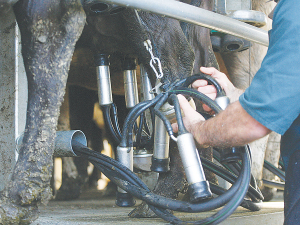Another Windfall for Fonterra Farmers, Unit Holders
Fonterra farmer shareholders and unit holders are in line for another payment in April.
 BNZ senior economist Doug Steel says there are risks on both the up and down sides - evidenced by Fonterra's wide $1.50 forecast range.
BNZ senior economist Doug Steel says there are risks on both the up and down sides - evidenced by Fonterra's wide $1.50 forecast range.
Fonterra's wide forecast milk price range for the new season is realistic, says BNZ senior economist Doug Steel.
The co-operative's $8/kgMS midpoint is the highest opening forecast milk price on record. The previous highest opening forecast was $7/kgMS on three separate occasions.
Last month, Fonterra announced its opening 2021-22 milk price forecast of $7.25 to $8.75. Synlait has come out with an $8 opening milk price.
Steel says the midpoint seems consistent with product prices falling from current levels but remaining elevated relative to long term averages through the season.
"This is a similar profile to what we have built into our 2021-22 milk price forecast of $7.80," he told Rural News.
"While the 20c difference to Fonterra's range mid-point is meaningful in absolute terms, we wouldn't split hairs at this stage of the season.
"There is a long way to go. Anything around these levels would be positive."
However, Steel points out that there are palpable risks on both sides - evidenced by Fonterra's wide $1.50 forecast range.
There is the possibility that global dairy prices may hold up better than expected as high international grain prices lift costs for NZ's northern hemisphere competitors.
He points out that US corn prices have more than doubled over the past 12 months. Such things make an aggressive global milk supply response to current higher dairy prices less likely.
"Indeed, the current milk-price-to-feed ratio in the US suggests milk production growth there is more likely to slow into year's end rather than lift," says Steel.
Other positives stem from the possibility that world growth proves even stronger than expected, as the vaccine rollout allows more reopening.
"On our calculations, if product prices and the NZ dollar remain around current levels for the entire season ahead it would see milk prices test the top end of Fonterra's price range."
But there are downside risks too and much hinges on Chinese demand.
According to Steel, strong Chinese demand is not assured.
"And there is a chance that as inflation picks up globally, central banks start thinking some of it will be persistent, such that they change their tune and start talk more about removing monetary stimulus.
"That could quickly take the edge off what has been a very strong run up in commodity prices."
Also, Covid hasn't gone away.
Steel says what matters most is what happens next - so all eyes back on coming Global Dairy Trade (GDT) auctions and the NZ dollar.
He says the small GDT price dip earlier this month is of little consequence for the season ahead.
The 5+ A Day Charitable Trust has launched a collection of affordable recipes designed to turn everyday vegetables into seasonal stars.
Jane Mellsopp has been confirmed as the new Government Appointee to the New Zealand Meat Board (NZMB).
To celebrate the tenth anniversary of its annual Good Deeds competition, Rabobank will give away $100,000 to improve rural community hubs, schools, clubrooms, and marae across New Zealand.
Agricultural and veterinary product supplier Shoof International has appointed Michaela Dumper as its new chief executive.
Federated Farmers is celebrating following the Government's announcement that young farmers will be able to use their KiwiSaver funds to buy their first home or farm.
The Meat Industry Association of New Zealand (MIA) today announced that Chief Executive Officer Sirma Karapeeva has resigned from the role.

OPINION: A mate of yours truly reckons rural Manawatu families are the latest to suffer under what he calls the…
OPINION: If old Winston Peters thinks building trade relations with new nations, such as India, isn't a necessary investment in…